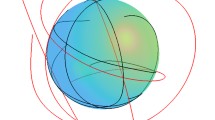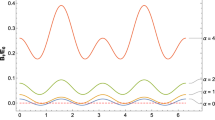Abstract
We investigate the theory of finite observables, i.e., resolutions of the finite-dimensional identity by means of positive operators, that have a physical interpretation in terms of measurement schemes. We focus on extremal and rank-one observables and consider various constructions that reduce observables to simpler ones. However, these constructions do not suffice to generate all finite extremal observables, as we show by means of counter-examples.
Similar content being viewed by others
References
Ludwig, G.: Versuch einer axiomatischen Grundlegung der Quantenmechanik und allgemeinerer physikalischer Theorien. Z. Phys. 181, 233–260 (1964)
Kraus, K.: States, Effects, and Operations: Fundamental Notions of Quantum Theory. Lecture Notes in Physics, vol. 190. Springer-Verlag, Berlin (1983)
Busch, P., Lahti, P., Pellonpää, J.-P., Ylinen, K.: Quantum Measurement. Springer-Verlag, Berlin (2016)
Talkner, P., Lutz, E., Hänggi, P.: Fluctuation theorems: work is not an observable. Phys. Rev. E 75, 050102 (2007)
Roncaglia, A.J., Cerisola, F., Paz, J.P.: Work measurement as a generalized quantum measurement. Phys. Rev. Lett. 113, 250601 (2014)
Holevo, A.S.: Estimation of shift parameters of a quantum state. Rep. Math. Phys. 13(3), 379–399 (1978)
Werner, R.F.: Screen observables in relativistic and nonrelativistic quantum mechanics. J. Math. Phys. 27(3), 793–803 (1986)
Kiukas, J., Ruschhaupt, A., Werner, R.F.: Tunneling times with covariant measurements. Found. Phys. 39(7), 829–846 (2009)
Helstrom, C.W.: “Simultaneous measurement” from the standpoint of quantum estimation theory. Found. Phys. 4(4), 453–463 (1974)
Holevo, A.S.: Covariant measurements and uncertainty relations. Rep. Math. Phys. 16(3), 385–400 (1979)
Holevo, A.S.: Probabilistic and Statistical Aspects of Quantum Theory. North-Holland Series in Statistics and Probability, vol. 1. North-Holland Publishing Co, Amsterdam (1982)
Werner, R.F.: Quantum harmonic analysis on phase space. J. Math. Phys 25(5), 1404–1411 (1984)
Kraus, K.: Position Observable for the Photon. In: Price, W.C., Chissick, S.S. (eds.) Uncertainty Principles and the Foundation of Quantum Mechanics. Wiley, New York (1977)
Guarnieri, G., Motta, M., Lanz, L.: Single-photon observables and preparation uncertainty relations. J. Phys. A 48(26), 5302 (2015)
Størmer, E.: Foundations of Quantum Mechanics and Ordered Linear Spaces. In: Hartkämper, A., Neumann, H. (Eds.) Springer-Verlag, Berlin, p. 85 (1974)
Parthasarathy, K.R.: Extremal decision rules in quantum hypothesis testing. Infin. Dimens. Anal. Quantum Probab. Relat. Top. 2(4), 557–568 (1999)
D’Ariano, G.M., Presti, P.L., Perinotti, P.: Classical randomness in quantum measurements. J. Phys. A 38, 5979–5991 (2005)
Pellonpää, J.-P.: Complete characterization of extreme quantum observables in infinite dimensions. J. Phys. A 44, 085304 (2011)
Heinosaari, T., Pellonpää, J.-P.: Generalized coherent states and extremal positive operator valued measures. J. Phys. A 45(24), 244019 (2012)
Haapasalo, E., Heinosaari, T., Pellonpää, J.-P.: When do pieces determine the whole? Extremal marginals of a completely positive map. Rev. Math. Phys. 26, 1450002 (2014)
Haapasalo, E.T.: Extreme observables and optimal measurements in quantum theory, Dissertation, University of Turku (2015)
Haapasalo, E., Pellonpää, J.-P.: Effective methods for constructing extreme quantum observables. arXiv:1809.09935 (2018)
Acknowledgements
An early version of this paper war co-authored by Paul Busch. Due to his untimely passing away we were not able to finish it as a joint paper. Therefore I have to publish it under my sole responsibility but simultaneously I gratefully acknowledge his essential contributions and, more generally, his continuous support and encouragement for research on fundamental questions of quantum theory. The community has lost a profound scholar and a person of integrity.
Author information
Authors and Affiliations
Corresponding author
Additional information
Publisher's Note
Springer Nature remains neutral with regard to jurisdictional claims in published maps and institutional affiliations.
Rights and permissions
About this article
Cite this article
Schmidt, HJ. Reduction and Extremality of Finite Observables. Found Phys 49, 577–593 (2019). https://doi.org/10.1007/s10701-019-00259-x
Received:
Accepted:
Published:
Issue Date:
DOI: https://doi.org/10.1007/s10701-019-00259-x




